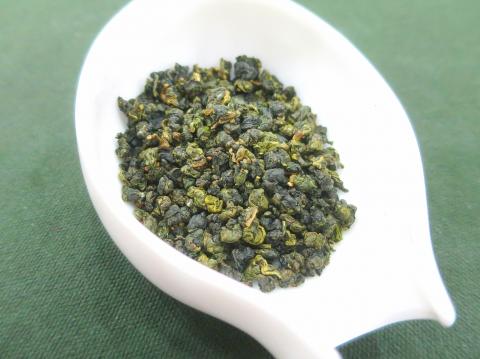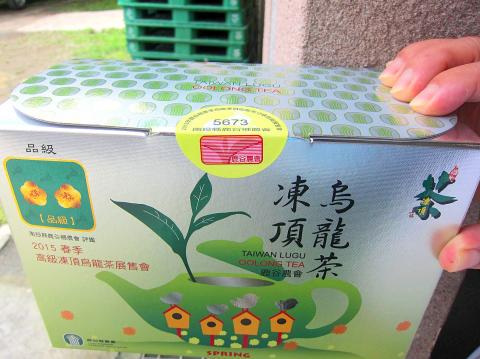Once a major tea-exporting country, Taiwan now produces less than 1 percent of the 3 million metric tons of tea produced around the world annually, but for international tea enthusiasts, Taiwan’s oolong tea industry is worth taking a trip to learn about.
Some have been able to do it through the “Taiwan Oolong Study Tour” program, or “TOST,” launched by the “Ambassador of Taiwan Tea” Thomas Shu (許正龍) and his wife Josephine Pan (潘掬慧) in 2008.
The program is the centerpiece of Shu’s mission to build the international reputation of Taiwan’s oolong teas and generate overseas demand for them to boost the tea industry, which has been in decline for years.

Photo: Liu Bin-quan, Taipei Times
This year’s promotional study tour, held for a 10th consecutive year, was attended by 11 tea professionals, about the same number as in previous years.
But this year’s group featured a far more diverse range of nationalities, with participants coming from Australia, Kuwait, Brazil, Argentina, Nepal and the US.
During the eight-day tour that concluded on Oct. 26, TOST members, led by Shu and Pan, visited tea farms producing seven varieties of oolong tea, participated in hands-on tea processing and met with tea scientists on the Council of Agriculture’s Tea Research and Extension Station (TRES).

Photo: Hsieh Jie-yu, Taipei Times
For many, the tour painted a different picture of Taiwan’s tea sector than what they had envisioned.
Simone Adamson, who joined TOST with her husband, said Taiwan wasn’t really on their radar as a place to visit until they started their tea company, More Tea, in Australia. Adamson said they learned through the TOST program that Taiwan is trying hard to be progressive in the tea industry and that the industry is willing to embrace change.
“It’s entrepreneurial, and the younger generation are willing to engage with new ideas and practices and also willing to engage with new customers like us,” she said.
Tania Stacey, owner of Cuppa Cha in Australia who was taking part in her third TOST, said that she has gained a real appreciation for tea’s place in Taiwan.
“I find Taiwan’s tea culture to be highly dedicated to providing the best tea experience and a wonderful, positive reflection of Taiwan’s history and its influences,” said Stacey, who was crowned Australian World Tea Brewers Cup Champion in September.
Stacey said her winning brew was made with Huang Ya from China but that it was blended with Hong Yu 21 from Taiwan “to add a nice body of citrus aroma and flavor. This tea with its natural citrus aroma and flavor is unique to Taiwan,” she said.
She also said Taiwan oolongs have “a smoothness and silky texture that continues to last and turns to a pleasantly sweet aftertaste,” characteristics that she adds come “from the terroir and dedication of TRES and the tea farmers to provide high quality special teas.”
Paul Richards, who owns The Tea Buzz, a tea shop in Oregon, said he was impressed with the level of technical expertise of the TRES and how that information is shared with the farmers, which benefits the entire industry.
MARKETING REQUIRED
He was also very appreciative of the efforts being made by Shu and Pan but felt more was needed for Taiwan’s tea industry to emerge, including having all tea farmers move toward certification.
Even more important is larger scale promotion, including establishing a larger presence at major tea conferences around the world, citing efforts by Sri Lanka.
“This year Sri Lanka celebrated 150 years of tea and they had a major presence at the World Tea Expo in Las Vegas. They did a nice job showing people in the industry what they are about,” Richards said.
“I think that the tea industry leaders in Taiwan should consider doing something similar [next year],” he said.
Richards was referring to next year marking 150 years since Taiwanese teas were first exported in 1869 by British merchant John Dodd, who shipped Taiwanese oolong teas under the name Formosa tea to New York.
Ahmad Aleidan, owner of Bayan Artisan Tea in Kuwait agreed that more promotion was needed.
He said Ceylon Teas from Assam, India are the most common teas in the Middle East and Arabian Gulf, and Japanese matcha is building a strong presence.
“Sadly I’m the only one that I know who offers any Taiwanese Tea,” he said.
But Aleidan said he will continue to strongly promote Taiwanese teas as he did for the last few years. “I’m optimistic that people [here] will pick up strongly soon.”

Behind a car repair business on a nondescript Thai street are the cherished pets of a rising TikTok animal influencer: two lions and a 200-kilogram lion-tiger hybrid called “Big George.” Lion ownership is legal in Thailand, and Tharnuwarht Plengkemratch is an enthusiastic advocate, posting updates on his feline companions to nearly three million followers. “They’re playful and affectionate, just like dogs or cats,” he said from inside their cage complex at his home in the northern city of Chiang Mai. Thailand’s captive lion population has exploded in recent years, with nearly 500 registered in zoos, breeding farms, petting cafes and homes. Experts warn the

The unexpected collapse of the recall campaigns is being viewed through many lenses, most of them skewed and self-absorbed. The international media unsurprisingly focuses on what they perceive as the message that Taiwanese voters were sending in the failure of the mass recall, especially to China, the US and to friendly Western nations. This made some sense prior to early last month. One of the main arguments used by recall campaigners for recalling Chinese Nationalist Party (KMT) lawmakers was that they were too pro-China, and by extension not to be trusted with defending the nation. Also by extension, that argument could be

Aug. 4 to Aug. 10 When Coca-Cola finally pushed its way into Taiwan’s market in 1968, it allegedly vowed to wipe out its major domestic rival Hey Song within five years. But Hey Song, which began as a manual operation in a family cow shed in 1925, had proven its resilience, surviving numerous setbacks — including the loss of autonomy and nearly all its assets due to the Japanese colonial government’s wartime economic policy. By the 1960s, Hey Song had risen to the top of Taiwan’s beverage industry. This success was driven not only by president Chang Wen-chi’s

Last week, on the heels of the recall election that turned out so badly for Taiwan, came the news that US President Donald Trump had blocked the transit of President William Lai (賴清德) through the US on his way to Latin America. A few days later the international media reported that in June a scheduled visit by Minister of National Defense Wellington Koo (顧立雄) for high level meetings was canceled by the US after China’s President Xi Jinping (習近平) asked Trump to curb US engagement with Taiwan during a June phone call. The cancellation of Lai’s transit was a gaudy